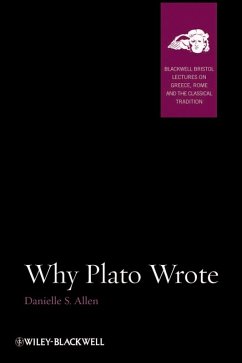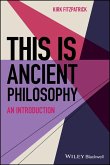Dieser Download kann aus rechtlichen Gründen nur mit Rechnungsadresse in A, B, BG, CY, CZ, D, DK, EW, E, FIN, F, GR, HR, H, IRL, I, LT, L, LR, M, NL, PL, P, R, S, SLO, SK ausgeliefert werden.
"I have learned much from this book. It demands that we connectPlato's writing to real life in his city. Even those who do notshare all its conclusions will be challenged by Allen's manyoriginal insights into how Plato used symbols to work on ourintellect, our preconceptual beliefs, and our emotions." (BrynMawr Classical Review, 21 November 2011)
"This extraordinary and scholarly book takes a fascinating newlook at Plato as politikos. It is a joy to read. Excellent notes,bibliography, and index. Summing Up: Essential. Upper-levelundergraduates through faculty/researchers." (Choice, 1 June2011)
"In this groundbreaking book Danielle Allen gives us Platofor the 21st century: a boldly pragmatic and fiercely politicalphilosopher, a 'legislator of the world' whose vividwriting reframed the moral practices of real communities, aprovocative and successful linguistic entrepreneur whose Socraticdialogues sparked a culture war that defined Athenian politics inthe Age of Alexander. Compelling reading for anyone who carespassionately about philosophy, politics, or classicalGreece."
Josiah Ober, Stanford University
"Why Plato Wrote is a deep and original work ofscholarship, a model of how the history of political philosophyshould be studied, and a pleasure to read."
Richard Kraut, Northwestern University
"Allen finds Plato to have invented himself as a writerin order to use language as a route to social change. Thesimple question 'why Plato wrote' unlocks a key to Plato'spolitical thought which no future scholar will be able to dowithout."
Melissa Lane, Princeton University









